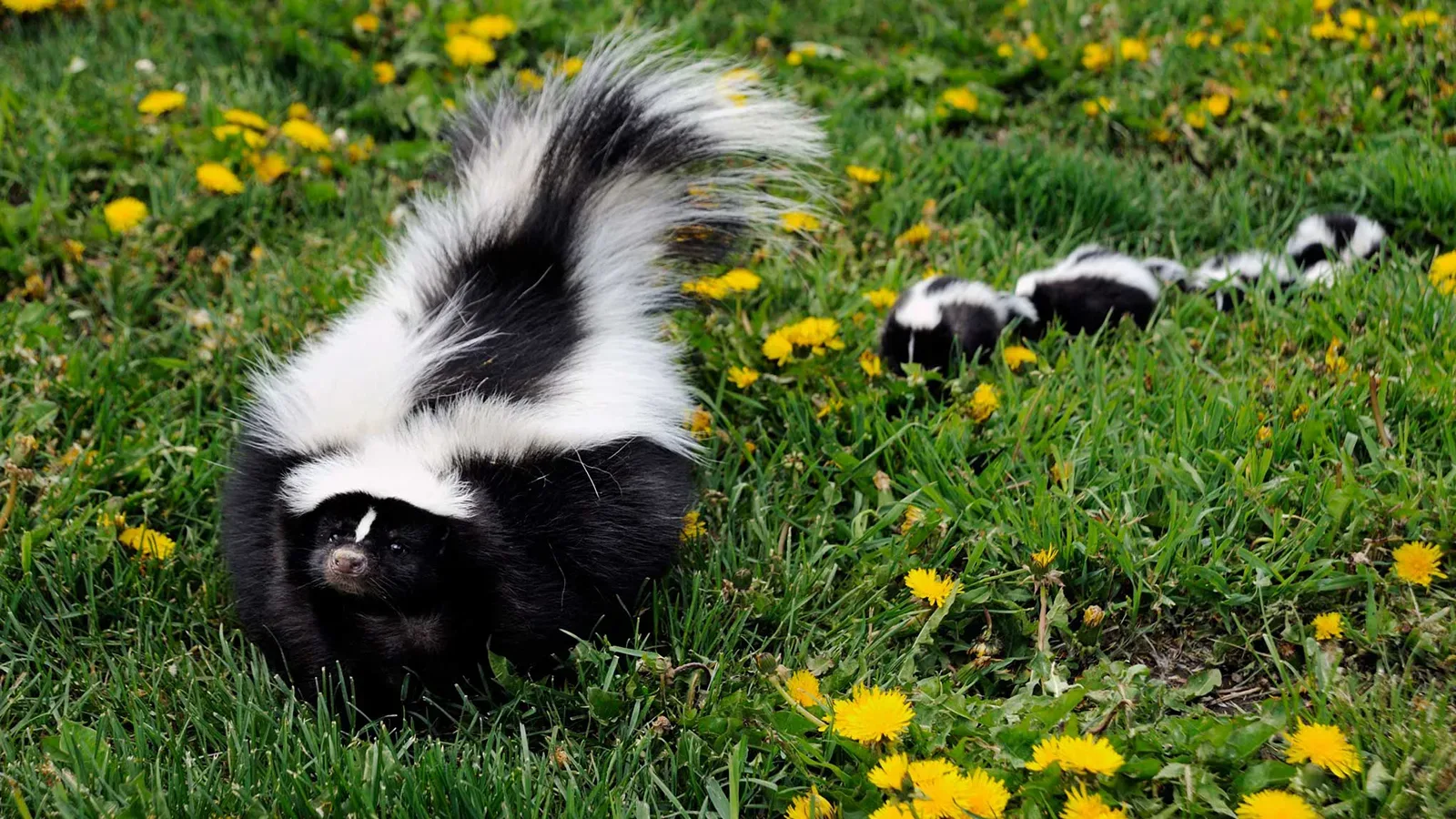
Written by s • Skunk Repellent
Skunks are famous for their smelly spray. It’s hard to describe skunk odor to someone who’s never experienced it; anyone who has experienced it doesn’t need it explained, because it’s not something you’ll ever forget. A whole class or folk remedies has grown up around how to remove the smell if you’re unlucky enough to get sprayed; unfortunately while some of the suggested deskunking methods are very colorful – try bathing in tomato soup, for example – none of them work all that well. At best you’re going to end up smelling of tomato soup with a hint of skunk; at worst, skunk with a hint of tomato soup.
Unfortunately skunks, while generally beneficial animals as far as nature’s concerned, aren’t really something you want around your home. They’re foragers, and can cause havoc in your yard – especially if you’re growing vegetables. Like raccoons they’ll happily pillage garbage cans. There’s the smell, of course. Worst of all skunks are a natural reservoir of rabies, and if you have them around your property and one becomes rabid your pets – and even your family – are in grave danger. Skunks can lower the value of your home by up to 10 percent, so if they make an appearance you should be looking for a way to make them move along.
Trapping skunks – live or especially lethally – should always be a last resort. Catch a skunk in a live trap and it’s going to be frightened, so anyone who comes near it is likely to get sprayed. It’s much better to persuade them that your yard isn’t somewhere to be, and there are a few ways to achieve this. First, take the same steps you would to deter chipmunks or raccoons – eliminate holes or cavities that make good dens, clear away sources of food (pet bowls are real skunk magnets) and keep things generally tidy. If that’s not enough you’re going to have to try some form of repellant.
A safe and modern option is an ultrasonic repeller. These emit a sound that’s far too high-pitched for humans to hear, but also very loud. You won’t even notice it but it’s deafening to a lot of small animals – including skunks. Look for one that’s motion activated so it isn’t using power constantly, but will only switch on when it detects a moving animal. A couple of these can shield your yard from all sorts of critters. The main problem is they will also drive your pets nuts, so if you have animals of your own something different is going to be required.
One option is a motion-activated sprinkler. These ae highly effective against many animals and they can drive off marauding skunks, too. The latest models are solar-powered and have small internal water tanks, so don’t need a hose or power supply. For best results look for droppings or animal tracks and place the unit nearby; any skunk following its usual trail around your property will get a big surprise, and after a couple of soakings is unlikely to return. An advantage of sprinklers is that they’re very environmentally friendly – all they spray is water, so there are no issues with chemicals. Like ultrasound units they can cause problems with your own pets though, so sometimes a chemical repellant is required.
There are many commercial animal repellants on the market but few of them are really effective against skunks. The problem is that these products are usually based on concentrated predator urine, and small animals are frightened away by the scent of an animal that might eat them. Skunks are pretty immune to most predators, though; while they’re prey-sized for many animals, from bobcats to bears, carnivores are generally reluctant to attack them because of their foul-smelling defensive tactic. The only regular predator on skunks is the great horned owl, and we don’t know of any repellants based on owl urine. Many products claim to deter skunks because they mimic the smell of its main predator, but take these claims with a pinch of salt; the main reason skunks are so bold is that practically nothing wants to eat them.
Not all repellants rely on the scent of predators, though. Some – Critter Ridder, for example – contain a mixture of pepper extracts, all of which are potent irritants. There are a few home-made alternatives too. Try mixing half a pint each of castor oil and dish soap, then diluting it in a gallon of water; spray it around your boundaries and any spots where there are signs of skunk activity. Heavy rain will wash the mixture away, so spray regularly. You can also boil two onions and a handful of jalapenos in a gallon of water, then stir in a quarter cup of cayenne pepper and simmer for half an hour. Again, spray this in likely spots.
Skunks can be a pest, but the good news is they’re easier to deter than some other critters. Their relative lack of predators means a lot of commercial products won’t bother them, but they are wild animals and naturally wary; you can exploit that to convince them to stay out of your yard.





